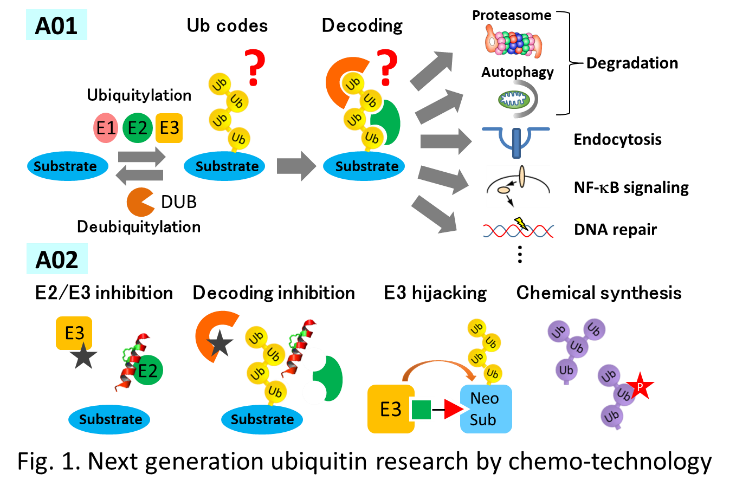
New frontier for ubiquitin biology driven by chemo-technologies
(Grant-in-Aid for Scientific Research on Innovative Areas, MEXT, Japan)
Purpose of the Research Project
Ubiquitin research today is deeply connected with almost all areas of life science research. The diversity of ubiquitin’s functions can be attributed to the structural variety of ubiquitin modification, called the ‘ubiquitin code’. However, these ubiquitin codes are more diverse and dynamic than expected, and the decoder molecules are also diverse, making it difficult to see the overall principles of ubiquitin codes. In addition, an increasing number of ubiquitin-associated diseases have been identified, but pathogenetic mechanisms have been elucidated for only a limited number. Hence, the research methods and tools for analyzing each ubiquitin-dependent pathway are in urgent demand.
This research project employs chemo-technologies as a new research tool to decipher, manipulate, and create ubiquitin codes. The objective is to elucidate as-yet-unknown principles of ubiquitin function in detail, as well as to establish novel techniques for ubiquitin-mediated regulation of cellular function.
Content of the Research Project
In close collaboration with life scientists and organic chemists, the project will progress on two fronts: understanding the mechanisms of ubiquitin codes using chemo-technologies (A01), and developing chemo-technologies for analyzing ubiquitin codes (A02) (Fig.1). The research group will be equipped with an extensive research support system that includes tools and equipment for compound screening, peptide synthesis, state-of-the-art proteomics analysis, and protein structure analysis. Specifically, to elucidate the mechanisms of ubiquitin code in each ubiquitin-dependent pathway, we will develop small-molecule compounds or stapled peptides that enable immediate inhibition of the particular function of each ubiquitin modification or decoder molecule. Also, by combining chemo-technologies with state-of-the-art proteomics analysis, this project will explore novel ubiquitin codes and decoder molecules, and simultaneously enable direct analysis of the higher-order structure of ubiquitin chains. On the other hand, by manipulating ubiquitin codes with small-molecule compounds, we will explore methodology for not only degradation, but also localization and activation of particular proteins.

Expected Research Achievements and Scientific Significance
Our research project will markedly improve our understanding of the mechanisms of ubiquitin codes. The chemical tools developed in this project can be applied to discovery of new biology pathways involving ubiquitin and correct understanding of the pathogenesis of ubiquitin-associated diseases, as well as drug development. Our project will also promote a new collaborative style between biologists and chemists.
Term of Project
FY2018–2022








